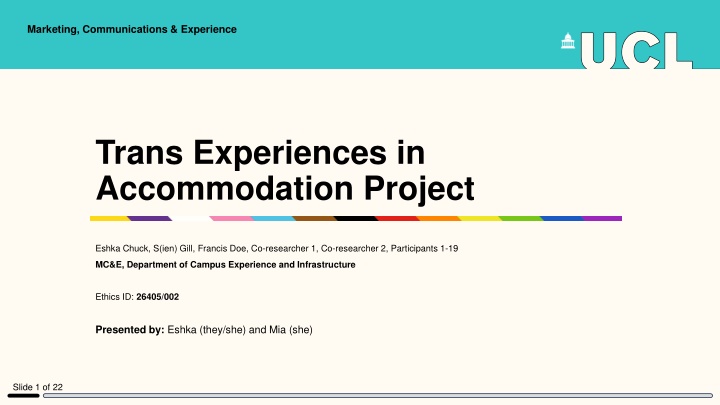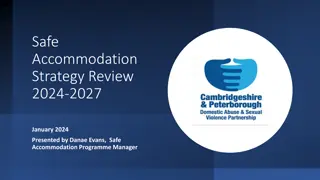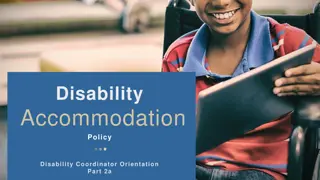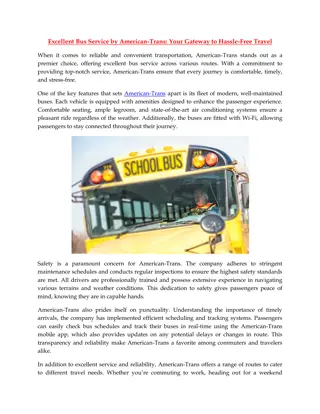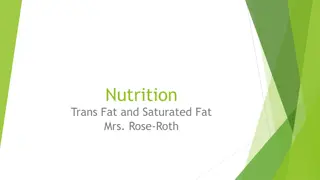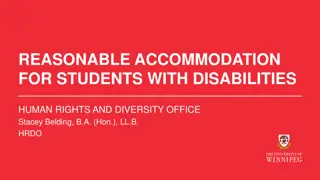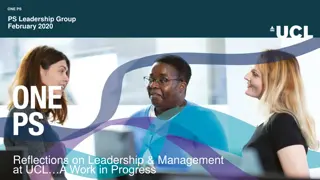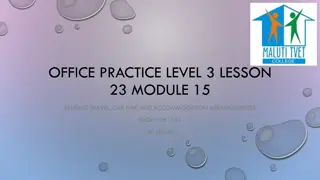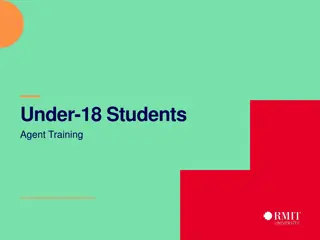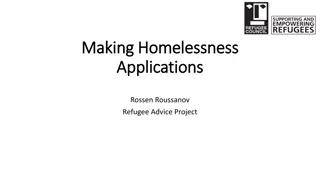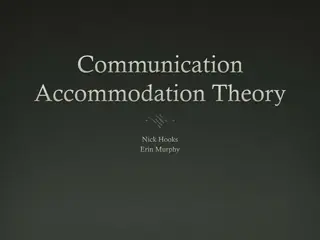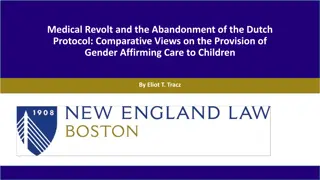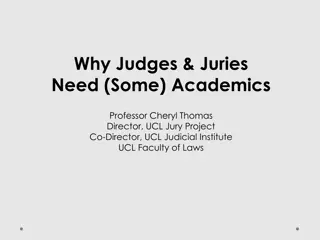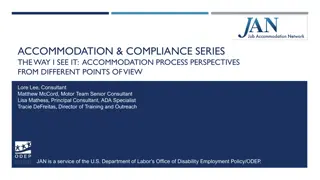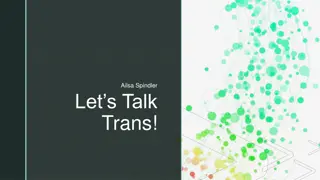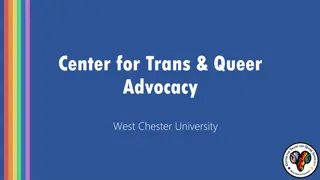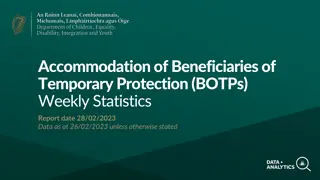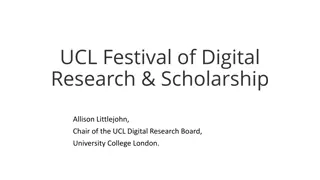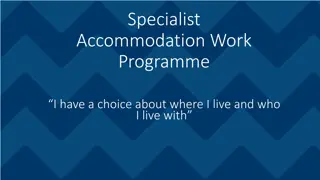Trans Experiences in Accommodation Project at UCL
Introducing the TEA project, a platform for trans voices in UCL Halls, focusing on policy research by trans students. The project explores thriving, safety, and belonging experiences, engaging with students ethically to gather insights. Discover the diverse perspectives of 22 students across 11 genders, highlighting the impact of luck on individual experiences. Learn about the participants' definitions of thriving and the nuances of their gender identities within societal norms.
Download Presentation

Please find below an Image/Link to download the presentation.
The content on the website is provided AS IS for your information and personal use only. It may not be sold, licensed, or shared on other websites without obtaining consent from the author.If you encounter any issues during the download, it is possible that the publisher has removed the file from their server.
You are allowed to download the files provided on this website for personal or commercial use, subject to the condition that they are used lawfully. All files are the property of their respective owners.
The content on the website is provided AS IS for your information and personal use only. It may not be sold, licensed, or shared on other websites without obtaining consent from the author.
E N D
Presentation Transcript
Marketing, Communications & Experience Trans Experiences in Accommodation Project Eshka Chuck, S(ien) Gill, Francis Doe, Co-researcher 1, Co-researcher 2, Participants 1-19 MC&E, Department of Campus Experience and Infrastructure Ethics ID: 26405/002 Presented by: Eshka (they/she) and Mia (she) Slide 1 of 22
What is the TEA project? A platform for the voices of the trans community in UCL Halls. Lived-experience policy research by trans students, for trans students Merging service review and academic research . Not: Quantitative research. The full picture of trans experiences at UCL. Slide 2 of 22
Trans a quick definition Shorthand for transcendent of the western cisgender binary . Encompasses individuals who face similar (structural) barriers to inclusion. Information sheet: Any person who is transgender, non-binary, agender, gender fluid, gender questioning, or otherwise gender non-conforming. Slide 3 of 22
What experiences did we explore? Thriving, safety, and belonging. The impact of UCL s processes, policies, practices, staff, and physical environments. Slide 4 of 22
How did we engage with students? Adopting some best practices of ethical co-production. Wellbeing centred acknowledging capacity Amplifying, not extracting Consensual anonymity. Phase 1: Online questionnaire. Phase 2: Voluntary, in-person discussions. Slide 5 of 22
What did we learn? Contributions from 22 students across 11 genders. Most overall experiences were neutral or slightly positive. A minority had very positive or very negative experiences. Luck was a significant factor in the quality of participant experiences. A lack of specific policies and practices dispose individual experiences to luck. Slide 6 of 22
Thriving Slide 7 of 22
What is thriving? Participant 3 (he/him): It means to live as normally as I can even though I cannot always live as the gender I am. Francis (they/them): Thriving would mean success in my chosen career, supportive friends I can rely on and who rely on me, and a functioning romantic relationship where all of these facets eliminate any notion of gender. Co-researcher 1 (Any pronouns): Not having to hide my gender identity and trans identities being spoken about in primarily non-queer settings as well. Having non-queer people ask me of my gender identity without being promoted and actually being interested. (Queer people always ask so that s good ) Slide 8 of 22
I feel that I am able to thrive in my Hall Slide 9 of 22
Thriving: Why? The genderless environment that isn t enabling for everyone. Invisibility and lack of opportunity to express gender increased dependence of thriving on trans-inclusive flatmates. Solution 1: Introduce queer iconography into Halls! Solution 2: Proactive allyship from Hall Teams normalising pronouns. Slide 10 of 22
Belonging Slide 11 of 22
What is belonging? Participant 2 (they/them): Feeling a sense of community, whether it is with other trans people or close, trusting friends I m allowed to belong in my skin. Co-researcher 1 (Any pronouns): To have no difference in attitudes towards me as opposed to any cis-gendered person, but also having a sense of acknowledgement that the trans life is naturally just more difficult than a cis-gendered person s. Francis (they/them): Working relationships, friendships, and romantic relationships that all centre around my personhood and not at all my gender. Slide 12 of 22
I feel that I belong in my Hall Slide 13 of 22
Belonging: Why? There is a general lack of (queer) community in Halls. Engagement with the Flourish ResLife programme among trans students is limited, due to lack of LGBTQIA+ centred activities. UCL lacks dedicated queer housing, unlike other HEIs. Solution 1: More relaxed, queer-centred social activities for Flourish. Solution 2: Have an actual discussion about the feasibility of queer halls. Slide 14 of 22
Safety Slide 15 of 22
What is safety? Participant 1 (they/them): Not feeling on edge all the time, feeling able to relax in my own space and not constantly looking over my shoulder. Participant 2 (they/them): Not being scared to go in public dressed as myself. Co-researcher 1 (Any pronouns): Going to gender-appropriate bathrooms and not being threatened. Essentially just existing and having my presence accepted everywhere. Slide 16 of 22
I feel safe in my Hall Slide 17 of 22
Safety: Why? Hall Teams take a proactive, pragmatic approach to safety. Some participants having ensuites. Specific measures Reducedsusceptibility to luck. Slide 18 of 22
Next steps Slide 19 of 22
The LGTBQIA+ Handbook idea Crisis support UCL support for LGBTQIA+ students LGBTQIA+ policies at UCL Advice from LGBTQIA+ students about studying at UCL. Where to go recommendations from LGBTQIA+ students (such as for haircuts, socializing, etc.). LGBTQIA+ rights in the UK Signposting to information about LGBTQIA+ healthcare (including medical transition) Information on how to be a good ally . Slide 20 of 22
MC&Es response Passing on recommendations to relevant teams and departments. Developing revised inclusivity training for Accommodation staff. Publishing the report on the UCL Accommodation website, with all research resources open sourced to enable future work. Relevant recommendations to be presented at an SU Policy Zone for democratic approval. Slide 21 of 22
Thank you! Questions? Slide 22 of 22
